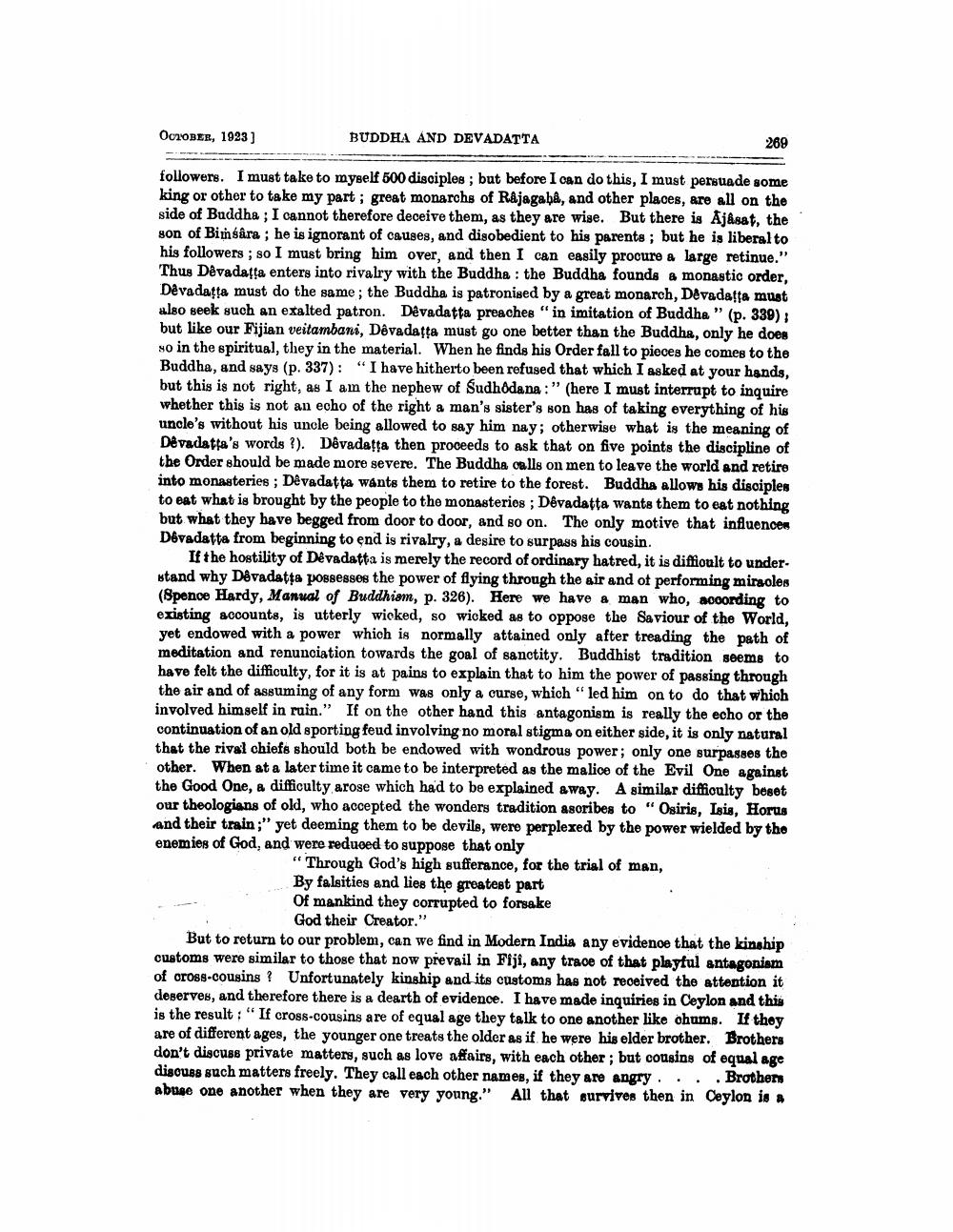________________
OCTOBER, 1923)
BUDDHA AND DEVADATTA
269
followers. I must take to myself 500 disciples ; but before I can do this, I must persuade some king or other to take my part; great monarchs of Rajagaha, and other places, are all on the side of Buddha ; I cannot therefore deceive them, as they are wise. But there is Ajásat, the son of Bigâra ; he is ignorant of causes, and disobedient to his parents ; but he is liberal to his followers; so I must bring him over, and then I can easily procure & large retinue." Thug Dêvadatta enters into rivalry with the Buddha : the Buddha founds & monastic order, Dévadatta must do the same; the Buddha is patronised by a great monarch, Devadafta must also seek such an exalted patron. Dêvadatta preaches "in imitation of Buddha" (p. 339): but like our Fijian veitambans, Dévadatta must go one better than the Buddha, only he does so in the spiritual, they in the material. When he finds his Order fall to pieces he comes to the Buddha, and says (p. 337): “I have hitherto been refused that which I asked at your hands, but this is not right, as I am the nephew of Sudhôdana :" (here I must interrupt to inquire whether this is not an echo of the right a man's sister's son has of taking everything of his uncle's without his uncle being allowed to say him nay; otherwise what is the meaning of Devadatta's words ?). Dêvadatta then proceeds to ask that on five points the discipline of the Order should be made more severe. The Buddha calls on men to leave the world and retire into monasteries ; Dêvadatta wants them to retire to the forest. Buddha allows his disciples to eat what is brought by the people to the monasterios ; Dévadatta wants them to eat nothing but what they have begged from door to door, and so on. The only motive that influences Dévadatta from beginning to end is rivalry, a desire to surpass his cousin
If the hostility of Dévadatta is merely the record of ordinary hatred, it is diffioult to under stand why Dêvadatta possesses the power of flying through the air and ot performing miracles (Spence Hardy, Manual of Buddhism, p. 326). Here we have a man who, according to existing accounts, is utterly wicked, so wicked as to oppose the Saviour of the World, yet endowed with a power which is normally attained only after treading the path of meditation and renunciation towards the goal of sanctity. Buddhist tradition seems to have felt the difficulty, for it is at pains to explain that to him the power of passing through the air and of assuming of any form was only a curse, which "led him on to do that which involved himself in ruin." If on the other hand this antagonism is really the echo or the continuation of an old sporting feud involving no moral stigma on either side, it is only natural that the rival chiefs should both be endowed with wondrous power; only one surpasses the other. When at a later time it came to be interpreted as the malice of the Evil One against the Good One, & difficulty arose which had to be explained away. A similar difficulty beset our theologians of old, who accepted the wonders tradition asoribes to " Osiris, Isis, Horus and their train;" yet deeming them to be devils, were perplexed by the power wielded by the enemies of God, and were redused to suppose that only
"Through God's high sufferance, for the trial of man, By falsities and lies the greatest part Of mankind they corrupted to forsake
God their Creator." But to return to our problem, can we find in Modern India any evidence that the kinship customs were similar to those that now prevail in Fiji, any trace of that playful antagonism of cross-cousins ? Unfortunately kinship and its customs has not received the attention it deserves, and therefore there is a dearth of evidence. I have made inquiries in Ceylon and this is the result: "If cross-cousins are of equal age they talk to one another like chums. If they are of different ages, the younger one treats the older as if he were his elder brother. Brothers don't discuss private matters, such as love affairs, with each other ; but cousins of equal age discuss such matters freely. They call each other names, if they are angry... Brothers abuse one another when they are very young." All that survives then in Ceylon is a




